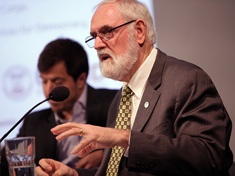-
Tom Staal on How Resilience Changes the Way USAID Works
March 20, 2015 By Linnea Bennett
When it comes to international development, a resilience framework is key, says Tom Staal, acting assistant administrator of the Bureau of Democracy, Conflict, and Humanitarian Assistance at USAID, in this week’s podcast.
When it comes to international development, a resilience framework is key, says Tom Staal, acting assistant administrator of the Bureau of Democracy, Conflict, and Humanitarian Assistance at USAID, in this week’s podcast.
“You need an approach that looks at everything from climate change, natural resource management, conflict issues, the sort of social dynamics of the country, as well as your long-term development approach to that group of people and the resources they have,” Staal says. “That put together, to me, is building resilience.”
Although it is sometimes considered a nebulous term, Staal, who has worked in humanitarian assistance for USAID since the 1980s, says the core idea of resilience is evaluating problems in a multidisciplinary manner. Understanding how environmental changes can have consequences for health and conflict, for example, or how gender dynamics dampen efforts to relieve poverty.
This is particularly important in fragile states.
In a previous era, USAID probably would have responded by trucking in water“They’re very vulnerable to a variety of problems,” said Staal. “They’re vulnerable to climate shocks, to climate change. They’re vulnerable to conflict over resources, but even things like conflict over water sources. And then that gets exacerbated when there is a drought.”
Staal worked in one pastoral community in southern Ethiopia that faced natural resource strain because of bad wells, with some wells producing no water at all. When drought hit, pastoralists were forced to move their cattle elsewhere. This then caused conflict between the displaced pastoralists and the communities already living in the spaces they arrived in. “How do we build [capacities] to give people the ability to withstand the shock, to rebound from it, and to move ahead?” Staal asked.
In a previous era, USAID probably would have responded by using humanitarian assistance money to truck in water, a hugely expensive endeavor, he says. Instead, in concert with the agency’s new resilience framework, designed to better address recurring crises, they repaired the pastoralists’ wells. This not only helped the communities manage their natural resources, but will hopefully curb the shock of drought and the potential for conflict in the future.
It may seem simple, but breaking down the topical siloes that have traditionally defined development and aid is a slow process. Merging humanitarian assistance and development projects has led USAID to also set up a “Resilience Leadership Team” and secretariat within the agency where staff from different bureaus and projects can discuss best practices and lessons. This allows for more cross-cutting solutions, which is really the heart of the approach, Staal says.
“Resilience is not a special initiative. It’s really a much more holistic way of looking at what we’re trying to accomplish.”
Tom Staal spoke at the Wilson Center on March 2.
Friday Podcasts are also available for download on iTunes.
 A Publication of the Stimson Center.
A Publication of the Stimson Center.




